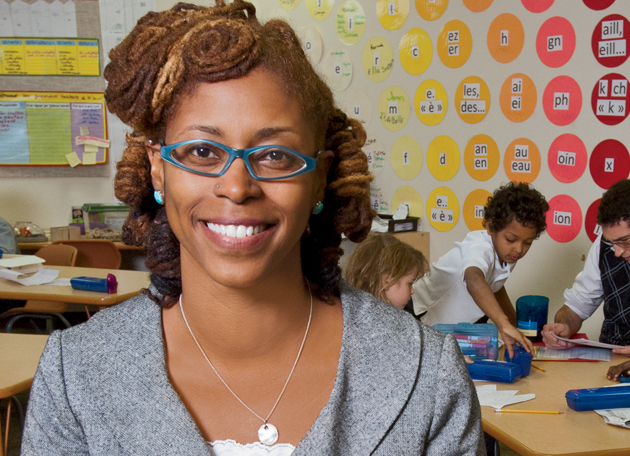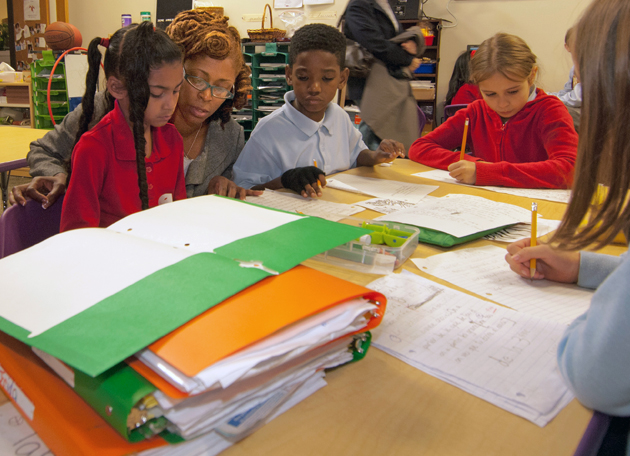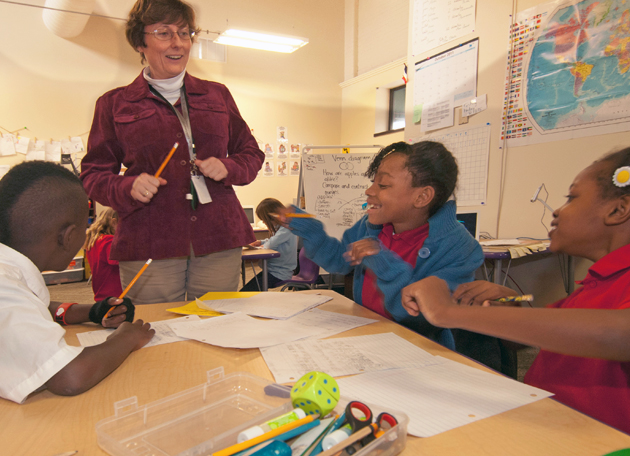
“Ici, on parle français” reads the sign in one hallway of the St. Louis Language Immersion Schools (SLLIS) in midtown St. Louis. Inside the buzzing classrooms, students from kindergarten through third grade are doing just that: learning all their lessons — reading, math, science, even gym — in French. Their birthdays, listed on the wall, are “anniversaires”; high-achievers are not stars but “étoiles”; and the teachers, who come from abroad and from the United States, are “Monsieur Sébastien” or “Madame Jennifer.”
“There’s a social revolutionary piece at this school. Everyone has the opportunity to come here and become little Rhondas — growing up in a working-class neighborhood, but with the same access to cultural and language opportunities as everyone else.”
—Rhonda Broussard
In another wing of the building, the same things are happening — but in Spanish. And in coming years, other language programs will be added: first Chinese and Japanese; later German, Farsi, Russian and Arabic. At a time when some charter schools are in trouble, this one is booming; since its opening in 2009, its enrollment has surged to 530. These eager students are also a diverse group, coming from 44 zip codes and a range of economic backgrounds, with 12 percent from St. Louis County and 45 percent qualifying for the free- or reduced-price lunch program.
The “étoile”-in-chief is Rhonda Broussard, AB ’97, a former French teacher who founded SLLIS and now serves as its president. Broussard, an enthusiastic advocate of language immersion education, had the vision of a school where any child — rich or poor, black or white — could become fully bilingual and well educated. With her own Francophone background and prestigious National Board Certification, she was the ideal person to create and run it.
“There’s a social revolutionary piece at this school,” Broussard says. “Everyone has the opportunity to come here and become little Rhondas — growing up in a working-class neighborhood, but with the same access to cultural and language opportunities as everyone else.”
Growing up with French
Broussard was born in Lafayette, La. Her maternal grandparents spoke French and Creole but thought their traditional language was too old-fashioned to teach to their children. By the time Broussard’s own daughter — Olivia, now 6 and an SLLIS student — was 3, she knew more French than Broussard’s parents did.
“I wanted my children to be bilingual,” says Broussard, who also has a 3-year-old son, Oscar, “because it was the last opportunity in our family to hold onto our language. My grandmother inspired me in everything I do, and I wanted to be in that space with her.”
As a second-grader, Broussard began taking French in school, and her interest grew. When she was 14, her grandmother died, and she began spending time with her paternal grandparents, who used French as their “language of secrets.” One day, Broussard overheard her grandmother gossiping on the phone in French — and realized, to her delight, that she had become fluent enough to understand every word.
At Washington University, where she majored in French and secondary education, Broussard took part in the Summer Language Institute, held at a chateau in the Loire Valley. But when she called home to rave about her experience, her grandmother said quietly: “You know, the French you’re learning over there is not what I speak. When you come home, I will speak it with you.”
So Broussard learned her grandmother’s Creole-infused French too. A few years later, that grandmother lay dying and could no longer recognize her loved ones. In her final exchanges, she lapsed into her native tongue — and among all the relatives, only Broussard could understand and comfort her. “It was heartfelt communication and what I had waited for all my life,” she says.

The next step
As a graduate student, Broussard went on to New York University, receiving a master’s degree in French studies. Afterward, she taught French in St. Louis, California, Connecticut and New York, but then she and her partner wanted to move closer to relatives. Would it be St. Louis or New Orleans? It was summer 2005, and Hurricane Katrina decided the question. They moved to St. Louis in 2006.
“I wanted to find a language immersion school here where my kids would not feel like anomalies but would grow up in a language space larger than me,” Broussard says. “Were we the only family that wanted that for our children?”
She printed flyers about language immersion, distributed them at an international festival — and a word-of-mouth campaign began. Meanwhile, Broussard founded an organization, La Crèche, which also generated interest in French instruction. And she discovered a happy coincidence: Vincent Schoemehl, former St. Louis mayor, and Robbyn Wahby, assistant to Mayor Francis Slay, were looking into language immersion too.
They joined forces, attracted the University of Missouri–St. Louis as their institutional sponsor, garnered major support from the Walton Family Foundation and the federal government — and began envisioning a school. For their building, they remodeled a bleak concrete flooring warehouse on Papin Street into a cheerful, colorful environment.
The school day
Among the students attracted to the school, 90 percent are native English speakers, and most of the rest are native Spanish speakers. During their first 2½ years, students gain enough language skill to do all their academic instruction in French or Spanish; in the middle of second grade, they begin taking an English-language arts course.
“It was a huge comfort to me to find so many people like me who said: ‘This is what I’ve been dreaming of. This is how I want my children to grow up. This is the community we want, and we’re so happy we have it.’”
—Rhonda Broussard
Broussard always warns new parents that their child’s early fluency may startle them. “I say: ‘If you studied language in high school, your child will know more than you do by the end of kindergarten. If you studied it at the university level, your child will know more by the end of third grade,’” she says.
Each year, the school plans to add another grade until they reach the 12th. All the while, the students’ instruction in English will grow so that by their final years of high school, they will take 80 percent of classes in English. At graduation, students should be fully bilingual, having earned Missouri high school and International Baccalaureate diplomas.
Ahead, Broussard faces giant challenges: adding the new language schools and moving to a larger space that will accommodate these programs. She also has to carve out time for her family, her service on the board of the Campus Y at Washington University, and her personal interest in dance.
But at last she has the school that she had hoped for. “It was a huge comfort to me to find so many people like me who said: ‘This is what I’ve been dreaming of. This is how I want my children to grow up. This is the community we want, and we’re so happy we have it.’”
Candace O’Connor is a freelance writer based in St. Louis.
For more information on the St. Louis Language Immersion Schools, visit http://sllis.org/wp/.

Comments and respectful dialogue are encouraged, but content will be moderated. Please, no personal attacks, obscenity or profanity, selling of commercial products, or endorsements of political candidates or positions. We reserve the right to remove any inappropriate comments. We also cannot address individual medical concerns or provide medical advice in this forum.